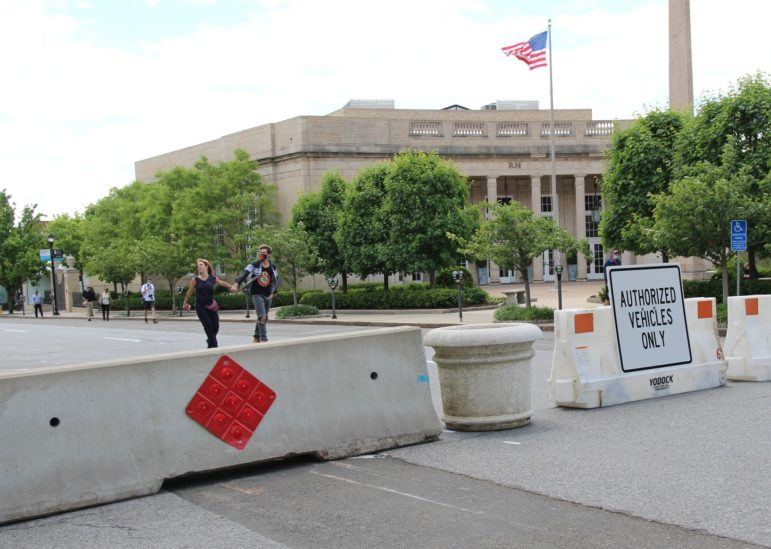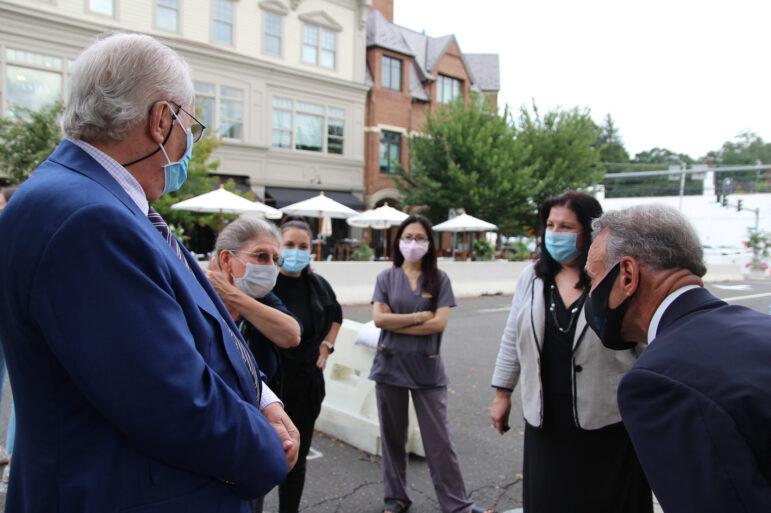The owner of Blankenship Dry Goods, a retail store at the top of Greenwich Avenue, is suing the Town’s Planning & Zoning Dept for alleged unfairness stemming from allowing restaurants to set up seasonal outdoor dining “nodes” in metered parking spaces.
While restaurants can apply for permits to use parking spaces for outdoor dining, retail establishments cannot.
Prior to the pandemic, the town’s regulations allowed outdoor dining by permit, but not in parking spots.
When Covid-19 arrived in March 2020, with schools closed and lockdowns imposed, restaurants and delis operated under health and public safety restrictions to offer takeout, delivery or curbside pickup.
Then on May 20, 2020 Governor Lamont’s executive order 7MM went into effect allowing restaurants to operate with outdoor seating only.
Planning & Zoning worked with First Selectman Fred Camillo to expedite outdoor dining. Initially, the two lower blocks of Greenwich Avenue were closed to traffic. But in response to retailers’ complaints, the block between Havemeyer and Fawcett/Grigg was reopened and restaurants on that block were provided individual “nodes.”
After the closure was limited to the block south of Grigg Street, retailers and property owners complained to Camillo who met with them in person.
At that meeting the retailers said their business had plummeted and landlords said they were having difficulty securing retail tenants.



The bottom block of Greenwich Ave was closed to thru traffic in June 2020. It was reopened in Sept 2020.
In October 2020, the Board of Selectmen held a Zoom public hearing that drew 85 participants. “What was a preventative measure, turned out to be not only a lifesaver for the Avenue, but really has given it new life,” Camillo said. “We’ll do our best to make it work for everybody. We don’t want it to work for just 75%.”
In November 2020 the Selectmen reversed their decision on the closure of lower Greenwich Avenue. The bottom of the Ave was reopened to vehicular traffic and the restaurants on those blocks also received outdoor dining nodes.
Restaurants do pay the town fees for use of the parking spots for dining. Initially, fees were waived in 2020.
In 2021 fees restaurants paid for the parking spaces were reduced to 25%. Finally, in 2022, restaurants were told they could not exceed four parking spaces and the fee was raised 100% of what the town would receive per meter on average $23 per day.
Outdoor Dining in Nodes Post-Covid
As the pandemic waned, the question of outdoor dining inside nodes arose.
The Planning & Zoning commission considered what to do about numerous restaurant violations. Some restaurants were operating outdoor dining without permits. There were complaints of loud music, sidewalks blocked, lost parking and vermin.
The commission noted that the Board of Selectmen, as the town’s traffic authority, regulated the use of public parking spaces, but P&Z had jurisdiction over what is allowed inside the “nodes.”
P&Z held a public workshop in July 2022 via Zoom for resident feedback where some described the outdoor dining as having boosted the Avenue’s vitality. Prior to the pandemic there were many conversations in public meetings – both P&Z and Board of Selectmen – about the dozens of empty storefronts on the Avenue. Residents lamented the decline of retail given the popularity of online shopping.
But there were also complaints about outdoor dining ranged from the unattractive jersey barriers, to the loss of parking spaces, and to the issue of fairness for retailers.
The director of P&Z at the time, Katie DeLuca, referred to “a free-for-all environment” that started during the pandemic.
“We can’t have an emergency concession we made for Covid overtake our town,” said resident Christina Volkwein. “That interferes with my use of the Avenue and my needs as a consumer. I don’t think that’s fair.”
Another resident, John Cooper, agreed. “In the expansion and possible codifying (outdoor dining) going forward you have the potential of absolutely wiping out other businesses,” Mr. Cooper said.



Carin Ohnell said that when she had been recovering from an ankle surgery and had a temporary handicapped parking permit, she became keenly aware of the locations of handicapped spaces. She noticed that an ADA space in front of Mediterraneo had been moved to half way down Fawcett Place to make room for a node for the restaurant. “We need to think about people with limited mobility,” she said.
Mr. Lenzo’s comments at that meeting foreshadow his lawsuit.
“You have to either give everyone the opportunity to do this, or give no one the opportunity to do this,” Lenzo said. “It has nothing to do with health any more.”
Then, at the July 14, 2022 Selectmen meeting, Mr. Lenzo was on the agenda with a request to use of parking spaces for a node outside his retail business. He said the town was picking and choosing winners and losers, and that the basis for his request was “equity.” He requested the Selectmen take a vote to give the same right to retailers.
Lenzo also urged the town to add a parking garage, and suggested it could be made to look attractive.
The Selectmen declined to vote on Mr. Lenzo’s request, but Mr. Camillo said the issue was worthy of further discussion and offered to visit Mr. Lenzo in his store.
P&Z held a second outdoor dining workshop in September 2022, also via Zoom, where Ms DeLuca said that townwide, 75 out of 96 restaurants with outdoor dining were in violation, mostly with increased number of seats, and 21 had outdoor dining despite not having received approval or even submitting an application.
P&Z commission chair Margarita Alban reminded her colleagues that the purview of the commission was to address “the vitality question.”
“It’s actually our job. The state statutes delegate to us in our planning role, to determine the highest and best use for land in the town,” Alban said.
She explained the Selectmen could vote to continue use of the outdoor dining nodes, but the P&Z commission determined what is allowed within them.
Commissioner Peter Lowe asked, “Can we set a regulation that says no outdoor dining within the nodes?”
“Yes,” Ms DeLuca replied.


Stricter Regulation for Restaurant Outdoor Dining
Ultimately, in December 2022, the P&Z commission approved a text amendment in Sec. 6-100, for requirements for seasonal outdoor dining from April 1 to Nov 20.
The amendment featured more strict rules for restaurants, and there was the promise of enforcement.
For starters, restaurants capacity would be enforced. The total number of seats combined for indoor and outdoor cannot exceed a restaurant’s capacity. For example, to put 25 seats in the street, 25 must be removed from indoors. During the pandemic, outdoor seating had been in addition to indoor seating.
Also, restaurants were required to provide a six foot ADA ramp to their nodes.
Another firm rule added was to require restaurants to refrain from amplified sound or music.
While some might have guessed the more strict text amendment would have discouraged restaurants from applying for permits, that has not been the case.
In summer 2023, Greenwich Avenue is as busy as ever.
Lenzo Complaint
Mr. Lenzo’s complaint says the Town of Greenwich was being sued for “Specific Performance,” and alleged unequal rights among businesses.
Mentioning “Specific Performance,” Lenzo’s complaint requests that either all business types be allowed to use the parking spaces on Greenwich Avenue – or none. He notes that the Covid health emergency had passed.
His complaint also refers to safety concerns – specifically whether someone dining inside a node might be injured if a car were to hit a barrier. Lenzo said he had witnessed “an unsturdy umbrella at La Taqueria fall onto a customer and send their plate flying…”
Reached by phone on Friday, Mr. Lenzo said he was representing himself pro se in Stamford Superior Court. He talked about issues of equity and safety, and said retailers were at a specific disadvantage not to be able to display their wares in the high visibility area for foot traffic on the Avenue. He said he merely sought an “equal opportunity.”
He commented on issues of safety as well.
“Has the town done a crash test on these barricades?” he asked. “If a car crashed into one of them would it have a bulldozer effect? How about if you had a rogue car or even a car backing out of a parking space and into a barrier?”
“If any one business owner or resident who wants to write a testimonial about the situation or join in with me on the matter about getting equal rights should contact me via my website.” https://www.blankenshipdrygoods.com/custom
Patrick LaRow, the director of Planning & Zoning, declined to comment for the story.
See also:
P&Z Revised Outdoor Dining Reg Adds Teeth: Violations Risk Immediate Closure Dec 23, 2022